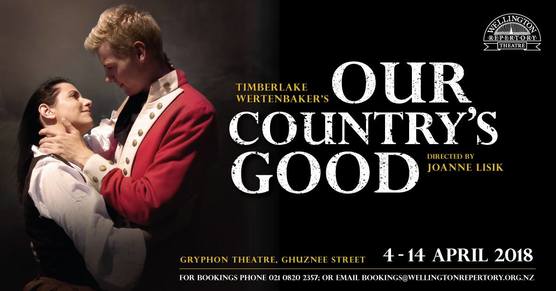Hamish Boyle
At an unjustifiable three hours, Our Country’s Good really struggled to hold a balanced pace throughout. Some sequences could certainly be truncated to hit their intentions sooner, as they feel like we’re moving through molasses. Often, characters are literally repeating themselves for no obvious effect; Boag’s Clark asks questions that are only answered the second time. And the dance sequences, while decently executed, seemed unnecessarily long additions to an already hefty script. If characters expressed themselves equally through dance as they do dialogue, it would have worked. As it stands, they read as jarring tonal shifts.
Our Country’s Good lacked a clear tone, seemingly wishing to be everything simultaneously. It’s part musical, part dance, part documentary, part tragedy, part meta-commentary, and part comedy, and none of it really meshes together cohesively. It opened like a musical, with two chorus numbers back-to-back. Music on oddly-balanced speakers plays over sparsely-placed dance routines. Angelica Thomas followed up with what becomes a recurring dance-based Aboriginal character. On the whole however, the Aboriginal sequences only ever felt problematic. While never the focus of the play, the approach seemed tactless for something so embedded in Australian history. Thomas’ Kuparr feels simultaneously reverential of the source culture, while perhaps over-comical in her reactions to the officers’ revelry, violence and gunfire. The context surrounding Thomas’ performance, in the text and direction, doesn’t leave much room for nuance.
The musical section reads like a documentative historical piece, followed by the theatrically tragic and positively unnerving wails and moans of the punished convicts at sea. Many of the standout narrative and performative beats of OCG are the tragedy-drenched gut punchers, as in Brewer’s ordering of Ketch to measure Liz for hanging.
But, at the same time, the script has all the theatre meta-commentary of a stand-up set, and the ensemble prove a great collective strength in varying comedic deliveries. These comedic moments seem to downplay the seriousness of the situation, making it out to be as if the emotional and physical abuse of the prisoners doesn’t matter as much as it should. Comedic scenes would unexpectedly jut out from tragic ones. Tragedy would unsatisfyingly grind against what was humorous. OCG fails to earn these tonal shifts, and so rather than an effective balance, it feels like two wildly alternate tellings of the same general event happening in parallel.
This is an ensemble-driven piece and the whole cast seems to feed and draw well from each other. However, there’s a few performances that must be pointed out. Richard Nicholls throws down the first act cliffhanger with a barely-under-control vile, sharp Scottish force that rends the air. Oliver Mander has a wonderful light-hearted nature as convict Ketch that pays off fantastically in a personal stand-out sequence where he’s commanded to measure Lydia Marston’s Liz prior to hanging. His hands tentatively grip around her neck, both of them earning every single tense beat. Comedic audience favourite may well be a fight between Haydn Carter’s Sideway and Amanda Eckersly’s Dabby, both exuding fantastic charisma and presence. I must also mention James Boag’s comparatively sky-scraping stoic deadpan as 2nd Lieutenant Clark. While these individual performances caught my eye, the best sequences are the ones with the most cast on stage. The ensemble work on display is a great effort by all, each part working together well to effectively achieve the scenes’ individual moods. However, sometimes the accents get lost in the commonwealth and muddy comprehension with lapses in articulation, and some scenes feel like they’re overplayed. McTague’s initial yell as Midshipman Brewer creates little room for him to go further as he drunkenly breaks down.
Our Country’s Good is indecisive like the officers’ quarrelling about their plans for the convicts. While the attention to detail given to the ensemble work and the standout sequences is mighty respectable and theatrically pleasing, there are equally as many moments that shy away from brilliance. It's raw length made active engagement tough and made dragging moments more noticeable. The tone drifted out of focus, unfortunately seeping levity into moments that required utter conviction, and gave the humour a harder job of landing. I’m left wanting to see this ensemble’s attempt at play with a tighter focus as, on the whole, Our Country’s Good didn’t seem to give them a fair shot.






